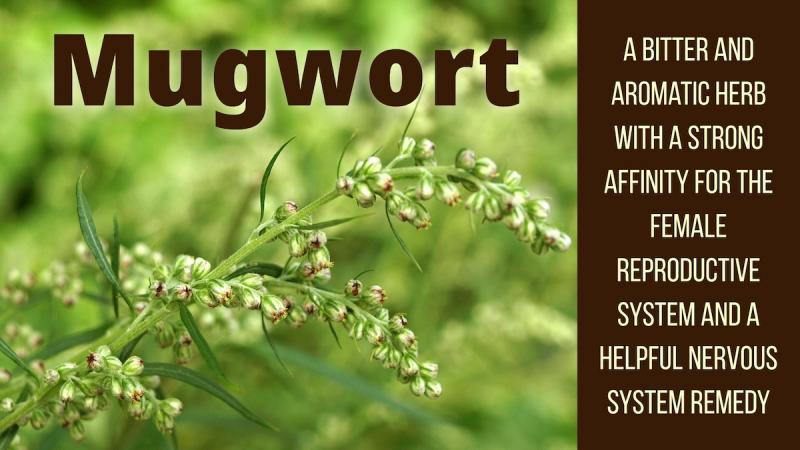
Mugwort is a member of the Artemesia genus, which also includes wormwood, tansy, sagebrush, and sweet annie. The primary species used in Western herbal medicine is Artemesia vulgaris. Vulgaris is related to the English word vulgar and means common or ordinary, but mugwort's medicinal properties are anything but ordinary. Like many other Artemesias, it’s both bitter and aromatic, with a warming, drying quality, and can improve appetite and digestive function. It may even have some antiparasitic and antimicrobial action in larger doses, but those aren’t its primary uses. 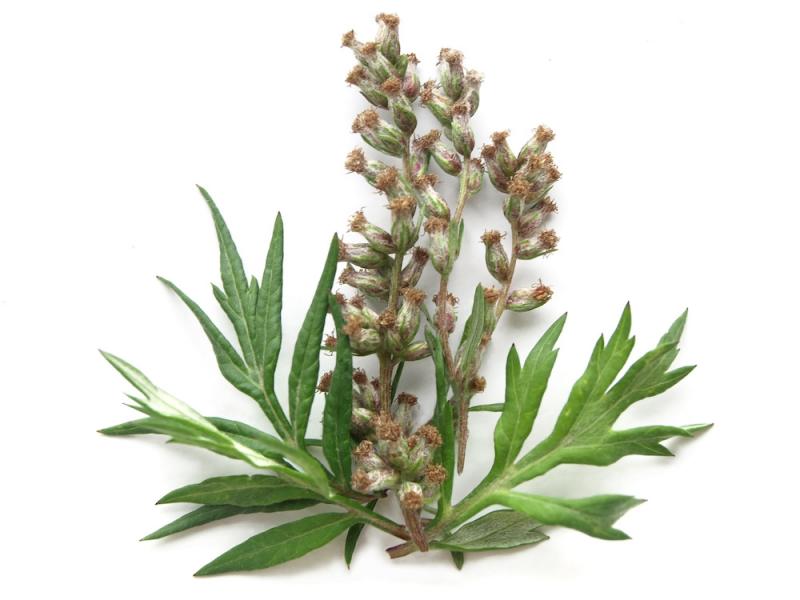
Mugwort as a Female Remedy
Mugwort has a strong affinity for the female reproductive system. It induces menstruation and acts as a uterine stimulant. It stimulates circulation and relieves congestion in the pelvic area, which can ease menstrual cramps, stiffness, and pain. It may also be helpful with problems like uterine prolapse, adhesions or injuries in the uterus, and profuse menstrual bleeding. It can also aid pain during childbirth or the expulsion of a dead fetus, so it is contraindicated in pregnancy. It’s also been used to strengthen women who are weak and feeble.
Mugwort, Moxibustion, and Magic
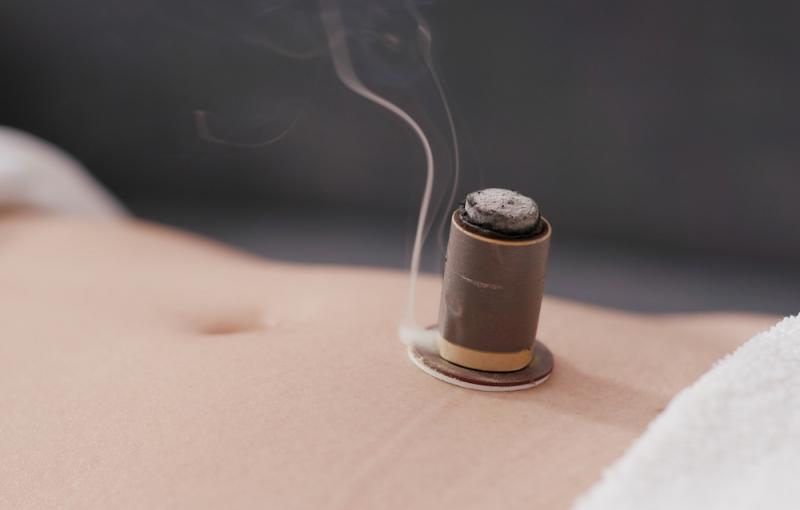 Mugwort has some interesting folklore surrounding its energetic properties. For starters, various species of mugwort are used in an Oriental therapy called moxibustion. The dried plant is burned over areas of the body to stimulate energy flow. The species typically used is A. argyi which is considered a remedy to “warm the channels” in traditional Chinese medicine. This means it helps move energy through the meridians of the body.
Mugwort has some interesting folklore surrounding its energetic properties. For starters, various species of mugwort are used in an Oriental therapy called moxibustion. The dried plant is burned over areas of the body to stimulate energy flow. The species typically used is A. argyi which is considered a remedy to “warm the channels” in traditional Chinese medicine. This means it helps move energy through the meridians of the body.
In the West, mugwort has long been considered to have magical powers. It is thought to ward off evil and protect people from danger. It was also used to make pillows to help a person have dreams that provided spiritual insight.
Mugwort as a Nervous System Remedy
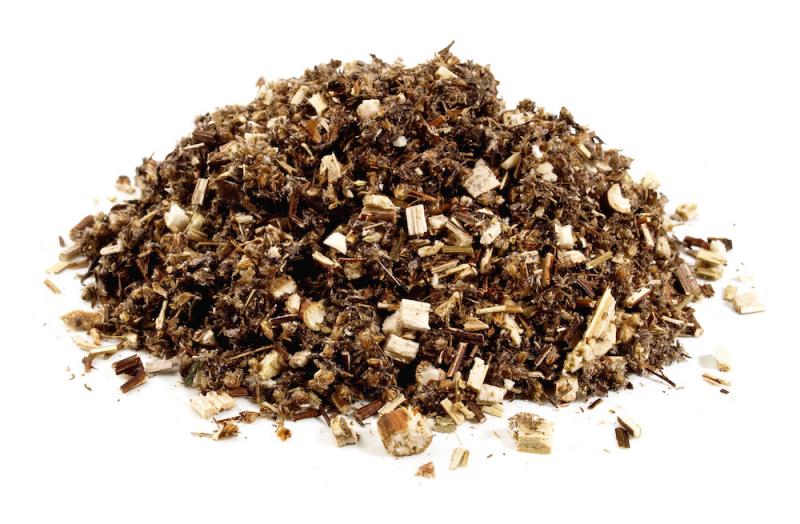 Dorothy Hall paints an interesting picture of a person who needs mugwort that is quite separate from its indications as a physical remedy. It help people who are sensitive, with heightened sensory awareness, and difficulty shutting down mentally. Their thoughts are complex and abstract, which means they may also struggle with practical things.
Dorothy Hall paints an interesting picture of a person who needs mugwort that is quite separate from its indications as a physical remedy. It help people who are sensitive, with heightened sensory awareness, and difficulty shutting down mentally. Their thoughts are complex and abstract, which means they may also struggle with practical things.
Their brains don’t settle down enough to allow for peaceful sleep, which means they can have vivid dreams or wake up unable to go back to sleep because they can’t stop thinking. They may also be sleepwalkers. They may also awaken easily from shallow sleep. The result may be brain fog during the day from a lack of deep sleep.
Mugwort is also reported to help people who have abused marijuana. I’ve observed that people who use marijuana regularly seem to become a little “spaced out,” so this seems to fit the energetic profile of the herb. It’s also been reported to aid opiate abuse
Mugwort Flower Essence
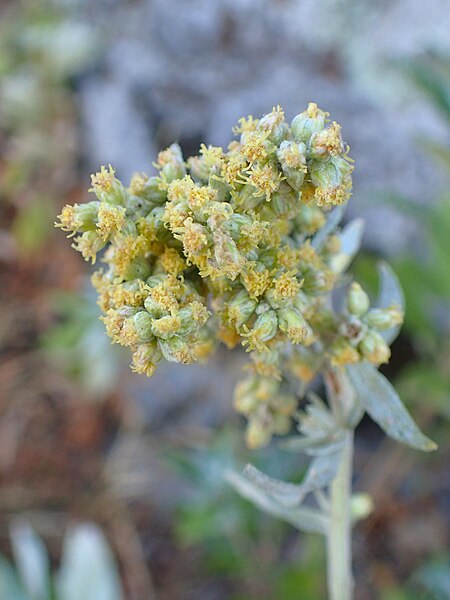 There’s a mugwort flower essence from Artemisia douglasiana, which may relate to the energy we just discussed about A. vulgare. People who need this flower essence tend to be highly intelligent and gifted people, but they have an inflated mental and/or spiritual life. This means they’re not very grounded, being out of touch with the physical world. So, they may have difficulty remembering simple practical things while they wander around with big ideas in their heads.
There’s a mugwort flower essence from Artemisia douglasiana, which may relate to the energy we just discussed about A. vulgare. People who need this flower essence tend to be highly intelligent and gifted people, but they have an inflated mental and/or spiritual life. This means they’re not very grounded, being out of touch with the physical world. So, they may have difficulty remembering simple practical things while they wander around with big ideas in their heads.
They may also be frustrated because of difficulty communicating their thoughts to others. Sometimes they are also dyslexic, which means the two hemispheres of the brain are not well integrated and don’t communicate properly. Abstract thinking is more left brain (which is the masculine side of the brain) and concrete thinking and emotional intelligence is more right brain (the feminine side of the brain), so the left side of their brain and their masculine energy may be overpowering the right side of the brain and the more feminine side of their nature.
They may appear to be slow learners when they are young because their minds are actually very active and they are easily distracted. They may also have experienced birthing trauma, something I find prevents people from fully embracing their physical body and the material world.
The flower essence helps integrate the person. It helps them integrate the mental world with their physical life, the two sides of their brain, and spiritual life with the practical life.
Using Mugwort
Mugwort can be taken as a tea, tincture, or capsules. You can drink one cup of the infusion one to three times a day. It’s made with 1-2 teaspoons of the dried herb per cup. For a standard 1:5 tincture, the dose is 20-80 drops two or three times a day. You can also take one capsule (450 mg) two or three times daily with meals. Don’t take mugwort herb during pregnancy or when trying to become pregnant, although it can be taken during childbirth. It’s a pretty strong herb so only use it for short periods (two or three weeks). Mugwort is best used as part of a formula.
Downloads
Steven's Articles
-

-
Barberry and Healthy Personal Boundaries
A thorny shrub for fighting infections and supporting…
December
-

-
The Evidence for Berberine
A yellow alkaloid found in traditional infection-fighting…
-

-
The Sensible Use of Caffeinated Herbs
Kola nuts, guarana, and yerba mate and other herbs…
-

-
The Health Benefits and Problems with Coffee
This popular caffeinated beverage can be beneficial…
October
-

-
Understanding Caffeine & Cellular Adaptation
Preserving the power of caffeine's buzz and the…
September
-

-
Horseradish
A pungent spice for aiding protein metabolism…
-

-
Banaba or Crepe Myrtle
A beautiful tree from Southeast Asia whose leaves…
August
-

-
Monkeyflowers
Flower essences to help see ourselves more clearly…
-

-
Mariposa Lilies
Strengthening the bond between mother and child…
-

-
The Noble Bay Leaf
A common kitchen herb for aiding digestion and…
-

-
Epimedium: Horny Goat Weed
A circulatory stimulant and kidney yang tonic…
July
-

-
The Medicinal and Nutritional Benefits of Apricots
A nutritious fruit and valuable medicinal seed for coughs
-

-
Dogwoods
Asian dogwood is used to stop excessive discharge,…
June
-

-
Neem: The Village Pharmacy
A popular Ayurvedic remedy for dental and immune…
-

-
Spilanthes: The Toothache Plant
A traditional remedy for teeth and gums, as well…

